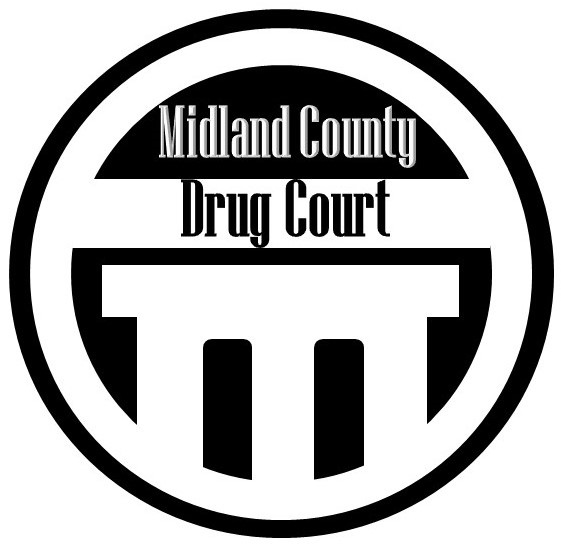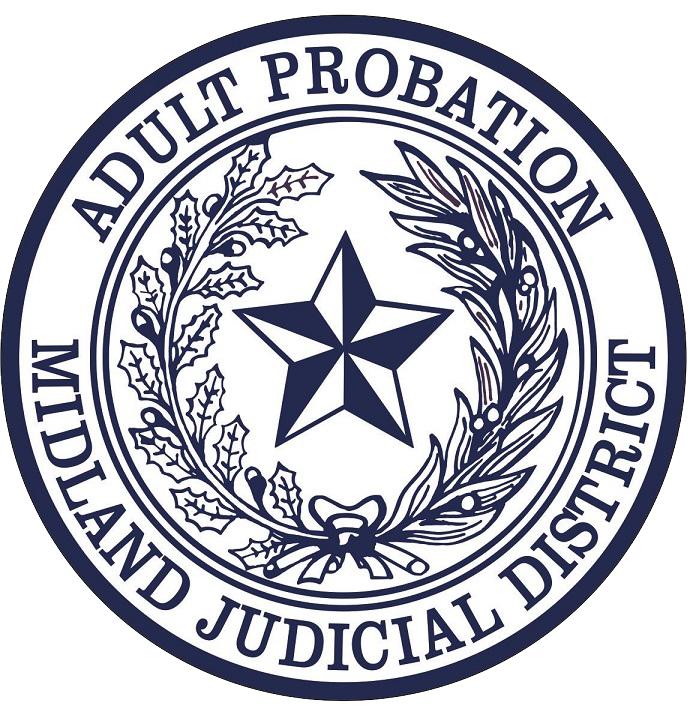Drug Court
More information about these Specialty Courts can be found at https://www.co.midland.tx.us/286/Drug-Court
The Midland County Drug Court Program focuses on the problem of addiction and provides a high level of direct accountability of the offender to the court. As a diversion from the incarceration system, the problem of addiction can be addressed at a cost savings to the citizens of Midland County as well as the State of Texas. Eligible participants of the Program are adults with a felony offense directly or indirectly relating to drugs and substance abuse. The Program is a comprehensive fourteen (14) month, five (5) phase program designed with specific objectives aimed at keeping the Participant sober and drug free while reducing recidivism. The Program implements acute, clinical adaptation, habitual, and continuous care. The Program demands Participant accountability by requiring judicial monitoring, mandatory treatment, intensive supervision, and law enforcement surveillance.
MISSION STATEMENT
The mission of the Midland County Drug Court Program is to enhance public safety as well as breaking the cycle of recidivism while reducing costs to the tax payers by providing a judicially supervised regimen of treatment and innovative case management to substance-dependent offenders with the goal of returning sober, productive, law-abiding citizens to society.
GOALS AND OBJECTIVES
The Goals and Objectives of the Midland County Drug Court Program are established to provide early drug and alcohol treatment and intervention for arrestees and offenders. The six goals of the program are as follows:
- GOAL #1: To provide early screening, assessment, and court intervention
- GOAL #2: To provide effective Court supervision
- GOAL #3: To provide an integrated program of drug treatment, substance abuse education, and rehab services
- GOAL #4: To promote public safety by reducing recidivism
- GOAL #5: To conserve community resources by reducing overcrowding in jails/prisons
- GOAL #6: To develop partnerships with public agencies and community organizations to help educate the public on addiction
TARGET POPULATION
The Midland County Drug Court Program will target non-violent male and female offenders age 17 and older who are assessed as High Risk and Needs and are charged with a felony offense for which substance abuse was a significant contributing factor.
ELIGIBILITY AND DISQUALIFICATION CRITERIA
ELIGIBILITY CRITERIA:
The opportunity to participate in the Midland County Drug Court Program will be limited to persons who meet the following criteria:
- Be at least 17 years of age.
- Have a currently pending charge for a felony offense in Midland County or currently be on community supervision for a felony offense in Midland County.
- Be a resident of Midland County or of a contiguous county with the ability to return to Midland County as needed to comply with the requirements of the Court.
- Be assessed as suffering from a substance use disorder that is suspected to have significantly contributed to the commission of the charged offense and/or the allegations that form the basis for a revocation of community supervision.
- Have a low probability, due to past history or the severity of substance use disorder, of successful completion of community supervision without Drug Court intervention.
- Must voluntarily submit to The Program and commit to complying with any and all requirements of The Program.
DISQUALIFICATION FACTORS:
Cases will be reviewed on an individual basis to determine the extent and circumstance surrounding the disqualifying factors versus the need to participate in The Program. The following factors are considered and will prevent a person from participating in The Program:
- The charged offense involved:
- carrying, possessing, or using a firearm or other dangerous weapon;
- the use of force against the person of another; or
- the death of or serious bodily injury to another;
- The defendant has a significant prior criminal history involving violent offenses.
- The charged offense is a sex offense that would be defined as a reportable conviction under Texas Code of Criminal Procedure Art. 62.001(5)
- The defendant has a prior conviction, deferred adjudication, or adjudication of delinquent conduct for a sex offense defined as a reportable conviction under Texas Code of Criminal Procedure Art. 62.001(5)
- The defendant has a prior conviction or deferred adjudication for a sex offense.
- The charged offense involved the delivery or manufacture of illegal drugs.
- The defendant has a significant prior criminal history involving the delivery or manufacture of illegal drugs.
- The defendant is seriously and persistently mentally ill and cannot participate in the structure of the Drug Court.
- The defendant is actively engaged as a confidential informant for law enforcement in any jurisdiction.
- Currently participating in another Midland County specialty court.
INTERDISCIPLINARY TEAM
The purpose of the Interdisciplinary Team is to provide a vessel for decision making regarding participants referred to The Program. Team Members will collectively make objective decisions about the Participant’s admission to, progress in, and discharge from The Program. The team composition is such that all facets of the system will be available to provide input and recommendations to the Judge on a non-biased well-informed level. Team Members will work together in making decisions regarding the disposition of a Participant’s case. Other interested parties from the participating groups will provide input regarding programming and program success.
TEAM MEMBERS
The Interdisciplinary Team will be compromised with the following members:
- Drug Court Judge
- Drug Court Coordinator
- Drug Court Prosecutor
- Drug Court Defense Counsel
- Drug Court
Community Supervision Officer
- Assigned from Midland CSCD
- Currently two Drug Court CSO’s assigned
- Drug Court
Treatment Provider
- Assigned from Midland CSCD
- Currently two Drug Court Treatment Providers (counselors) assigned.
- Drug Court Law Enforcement Officer
- Drug Court Evaluator/Data Manager

Documents
DWI Court
More information about these Specialty Courts can be found at https://www.co.midland.tx.us/778/DWI-Court
The Midland County DWI Court Program utilizes a non-traditional, pro-active approach to corrections and rehabilitation at the community level and in the treatment of at-risk offenders in overcoming serious drug addictions. The Midland County DWI Court Program focuses on the problem of addiction and provides a high level of direct accountability of the offender to the court. As a diversion from the incarceration system, the problem of addiction can be addressed at a cost savings to the citizens of Midland County as well as the State of Texas. Eligible participants of the Program are adults with a driving while intoxicated offense. The Program is a comprehensive eleven (11) month, five (5) phase program designed with specific objectives aimed at keeping the Participant sober and drug free while reducing recidivism. Treatment for addiction looks different for each participant therefore there are no set timelines for the program other than a participant must complete a minimum of eleven (11) months under the supervision of the court. The total amount of time required for successful completion will vary person to person. The Program implements acute, clinical adaptation, habitual, and continuous care. TheProgram demands Participant accountability by requiring judicial monitoring, mandatory treatment, intensive supervision, and law enforcement surveillance.
MISSION STATEMENT
The mission of the Midland County DWI Court is to enhance public safety as well as breaking the cycle of recidivism while reducing costs to the tax payers by providing a judicially supervised regimen of treatment and innovative case management to substance-dependent offenders with the goal of returning sober, productive, law-abiding citizens to society.
GOALS AND OBJECTIVES
The Goals and Objectives of the Midland County DWI Court are established to provide early drug and alcohol treatment and intervention for arrestees and offenders. The six goals of the program are as follows:
- GOAL #1: To provide early screening, assessment, and court intervention
- GOAL #2: To provide effective Court supervision
- GOAL #3: To provide an integrated program of drug treatment, substance abuse education, and rehab services
- GOAL #4: To promote public safety by reducing recidivism
- GOAL #5: To conserve community resources by reducing overcrowding in jails/prisons
- GOAL #6: To develop partnerships with public agencies and community organizations to help educate the public on addiction
ELIGIBILITY CRITERIA:
The opportunity to participate in the Midland County DWI Court Program will be limited to persons who meet the following six criteria:
- Be at least 17 years of age.
- Have a currently pending charge for a driving while intoxicated or driving under the influence offense in Midland County or currently be on community supervision for a driving while intoxicated or driving under the influence offense in Midland County.
- Be a resident of Midland County or of a contiguous county with the ability to return to Midland County as needed to comply with the requirements of the Court.
- Be assessed as suffering from a substance use disorder that is suspected to have significantly contributed to the commission of the charged offense and/or the allegations that form the basis for a revocation of community supervision.
- Have a low probability, due to past history or the severity of substance use disorder, of successful completion of community supervision without Drug Court intervention.
- Must voluntarily submit to The Program and commit to complying with any and all requirements of The Program.
DISQUALIFICATION FACTORS:
Cases will be reviewed on an individual basis to determine the extent and circumstances surrounding the disqualifying factors versus the need to participate in The Program. Those cases declined for acceptance into the Midland County DWI Court Program will be retained by the originally assigned/referringjudge. The following factors are considered and may prevent a person from participating in The Program;however, the DWI Court Judge retains judicial discretion and makes the final determination on acceptance into The Program:
- Other pending offenses involved:
- Use of a firearm or other dangerous weapon; or
- the death of or serious bodily injury to another
- The defendant has a significant prior criminal history involving violent offenses.
- The defendant has a prior conviction, deferred adjudication,or adjudication of delinquent conduct for a sex offense defined as a reportable conviction under Texas Code of Criminal Procedure Art. 62.001(5).
- The defendant has a prior conviction or deferred adjudication for a sex offense.
- The defendant has a significant prior criminal history involving the delivery or manufacture of illegal drugs.
- The defendant is seriously and persistently mentally ill and cannot participate in the structure of the DWI Court.
- The defendant is actively engaged as a confidential informant for law enforcement in any jurisdiction.
- Currently participating in anotherMidland County specialty court.
- The defendant has current pending charges in another county which may result in loss of control over the defendant during their participation in the Program.
- The defendant is currently on parole.
Transition Treatment Court (TTC)
More information about these Specialty Courts can be found at https://www.co.midland.tx.us/286/Drug-Court
The Midland County Transitional Treatment Court Program utilizes a non-traditional, pro-active approach to corrections and rehabilitation at the community level and in the treatment of at-risk offenders in overcoming serious drug addictions. The Midland County Transitional Treatment Court Program focuses on the problem of addiction and provides a high level of direct accountability of the offender to the court. As an aftercare plan following incarceration in a treatment facility, the problem of addiction can continue to be addressed at a cost savings to the citizens of Midland County as well as the State of Texas. Participants of the Program are adults who have completed their court ordered time at either a Substance Abuse Felony Punishment Facility (SAFPF) or a Court Residential Treatment Center (CRTC) and are returning to Midland County to continue their treatment and probation sentence. The Program is a comprehensive nine (9) month, five (5) phase program designed with specific objectives aimed at keeping the Participant sober and drug free while reducing recidivism. The Program implements relapse prevention, life management, personal growth, and continuous care focused modules. The Program demands Participant accountability by requiring judicial monitoring, mandatory treatment, intensive supervision, and law enforcement surveillance.
MISSION STATEMENT
The mission of the Midland County Transitional Treatment Court is to enhance public safety as well as breaking the cycle of recidivism while reducing costs to the tax payers by providing a judicially supervised regimen of treatment and innovative case management to substance-dependent offenders with the goal of returning sober, productive, law-abiding citizens to society.
GOALS AND OBJECTIVES
The Goals and Objectives of the Midland County Transitional Treatment Court are established to provide continued drug and alcohol treatment for successful completers of the SAFPF and CRTC programs. The six goals of The Program are as follows:
- GOAL #1: To provide continue treatment for citizens re-entering our community following treatment at a Substance Abuse Felony Punishment Facility or Court Residential Treatment Center
- GOAL #2: To provide effective Court supervision
- GOAL #3: To provide an integrated program of drug treatment, substance abuse education, and rehab services
- GOAL #4: To promote public safety by reducing recidivism
- GOAL #5: To conserve community resources by reducing overcrowding in jails/prisons
- GOAL #6: To develop partnerships with public agencies and community organizations to help educate public on addiction
PROGRAM STRUCTURE
The Midland County Transitional Treatment Court Program is a comprehensive nine (9) month, five (5) phase program designed with specific objectives aimed at keeping the Participant sober, drug free, and reducing recidivism. Participants are those individuals returning to Midland County from treatment at either a Substance Abuse Felony Punishment Facilities (SAFPF) or Court Residential Treatment Center (CRTC) and entering the aftercare phase of their recovery. The Program implements relapse prevention, life management, personal growth, and continuous care focused modules. The Program demands offender accountability by requiring judicial monitoring, mandatory treatment, and intensive supervision.
TARGET POPULATION
The Midland County Transitional Treatment Court Program will be comprised of male and female offenders age 17 and older who are returning to Midland County following successful discharge from either a Substance Abuse Felony Punishment Facility (SAFPF) or Court Residential Treatment Center (CRTC).
ELIGIBILITY CRITERIA
Eligible Participants for the Transitional Treatment Court Program are male and female offenders who have been successfully discharged from either a Substance Abuse Felony Punishment Facility (SAFPF) or Court Residential Treatment Center (CRTC). The Judge reserves the right to accept non-SAFPF and non-CRTC offenders into the Program upon review on a case-by-case basis.
INTERDISCIPLINARY TEAM
The purpose of the Interdisciplinary Team is to provide a vehicle for decision making regarding participants referred to The Program. Team Members will collectively make objective recommendations about the Participant’s progress in and discharge from The Program. The team composition is such that all facets of the system will be available to provide input and recommendations to the Judge on a non-biased will-informed level. Team Members will work together in making decisions regarding the disposition of a Participant’s case. Other interested parties from the participating groups will provide input regarding programming and program success.
TEAM MEMBERS
The Interdisciplinary Team will be compromised with the following members:
- Transitional Treatment Court Judge
- Transitional Treatment Court Coordinator
- Transitional Treatment Court Defense Counsel
- Transitional Treatment Court Community Supervision Officer
- Transitional Treatment Court Treatment Provider
- Transitional Treatment Court Prosecutor
- Transitional Treatment Court Law Enforcement Officer
- Transitional Treatment Court Evaluator/Data Manager

Midland County Veterans Treatment Court (VTC)
The Mission of the Midland County Veterans Treatment Court (VTC) is to enhance public safety by meeting the treatment needs of Veterans experiencing military-related mental health issues in a judicially supervised environment.
The Midland County Veterans Treatment Court (VTC) provides a means to successfully rehabilitate veterans by diverting them from the traditional criminal justice system and providing them with the tools they need to lead productive and law-abiding lives through treatment, rehabilitative programming, reinforcement, and judicial monitoring.
Most veterans are strengthened by their military service, but the combat experience has unfortunately left a growing number of veterans with Post-Traumatic Stress Disorder and Traumatic Brain Injury. One in five veterans has symptoms of a mental health disorder or cognitive impairment. One in six veterans who served in Operation Enduring Freedom and Operation Iraqi Freedom suffer from a substance abuse issue. Research continues to draw a link between substance abuse and combat–related mental illness. Left untreated, mental health disorders common among veterans can directly lead to involvement in the criminal justice system.
The Veterans Treatment Court model requires regular court appearances (a bi-weekly minimum in the early phases of the program), as well as mandatory attendance at treatment sessions and frequent and random testing for substance use (drug and/or alcohol). Veterans respond favorably to this structured environment given their past experiences in the Armed Forces. However, a few will struggle and it is exactly those veterans who need a Veterans Treatment Court program the most. Without this structure, these veterans will reoffend and remain in the criminal justice system. The Veterans Treatment Court is able to ensure they meet their obligations to themselves, the court, and their community.
A Better Understanding
Veterans Treatment Courts allow jurisdictions to serve a large segment of the justice-involved veteran population as opposed to business as usual – having all veterans appear before random judges who may or may not have an understanding of their unique problems. Because a Veterans Treatment Court judge handles numerous veterans' cases and is supported by a strong, interdisciplinary team, he or she is in a much better position to exercise discretion and effectively respond than a judge who only occasionally hears a case involving a veteran defendant. A Veterans Treatment Court judge better understands the issues that a veteran may be struggling with, such as substance addiction, Post-Traumatic Stress Disorder, Traumatic Brain Injury, and military sexual trauma. A Veterans Treatment Court judge is also more familiar with the Veterans Health Administration, Veterans Benefit Administration, State Department of Veterans Affairs, Veterans Service Organizations, and volunteer Veteran Mentors and how they all can assist veteran defendants.
Camaraderie Among Those Who Served
Veterans Treatment Courts are tapping into the unique aspects of military and veteran culture and using it to the benefit of the veteran. Through these unique courts, those who served in our nation’s Armed Forces are allowed to participate in the treatment court process with their fellow veterans, re-instilling a sense of camaraderie that they felt while in the military. The Veterans Treatment Court is the military unit: the judge becomes the Commanding Officer, the Veteran Mentors become fire team leaders, the court team becomes the company staff, and the veteran defendants become the troops. For those who have spent any time in traditional criminal courts, a visit to a Veterans Treatment Court is somewhat of a revelation. Veteran defendants are standing before the judge at parade rest, saying “Yes, ma’am/sir” or “No, ma’am/sir,” and there is interaction with and support from their fellow veterans.
One-Stop Shop
In addition, Veterans Treatment Courts act as a “one-stop shop,” linking veterans with the programs, benefits and services they have earned. For example, the Veterans Health Administration's Veterans Justice Outreach Specialist, or VJO, is present during the court docket with a laptop computer able to access confidential medical records, make treatment appointments, and communicate this information to the court. The Veterans Benefit Administration may provide a representative to ensure that veterans receive disability compensation, and education and training benefits. Veterans Service Organizations and State Departments of Veterans Affairs assist veterans with additional local and state resources, while volunteer Veteran Mentors provide morale and motivational support. These team members are not employed by the criminal justice system and normally would not be present at the courthouse. Consolidating justice-involved veterans onto a single docket permits these individuals to actively support those in need of their help.
Midland County Mental Health Court (MHC)
In December 2013, the Midland County Mental Health Court (MHC) was established to more effectively address the increasing number of mentally ill defendants cycling through the courts and jails. The MHC is a collaboration of the 238th District Court, the District Attorney’s Office, the Permian Basin Community Center, Midland County Adult Community Supervision Corrections Department and local defense counsel.
MISSION
To better serve individuals with mental health issues in the Criminal Justice System through a collaboration of the Justice System and different community agencies.
GOALS
The primary goals of the Mental Health Court are to:
- connect criminal participants who suffer from serious mental illness to treatment services in the community;
- find appropriate dispositions to criminal charges, taking into consideration the facts of each case and prior criminal history;
- ensure public safety and reducing recidivism and violence on re-arrest through appropriate mental health treatment and intensive supervision; and
- increase collaboration between the court, counsel, county agencies and community mental health treatment services.
ELIGIBILITY FOR MENTAL HEALTH COURT
An individual must meet the criteria for a serious mental illness, defined as major depressive disorder, bi-polar disorder, schizophrenia or schizo-affective disorder. Individuals with co-occurring substance use disorders are also considered where the mental health diagnosis is primary. MHC targets individuals that have a high to moderate criminogenic risk of re-offending, as determined by the Community Supervision and Corrections Department.
To be considered for MHC, an individual must be charged with, convicted of, or on probation for a misdemeanor or felony offense. The participant’s prior criminal history and treatment history in the community mental health system are considerations in determining eligibility. MHC participants must reside in Midland or Ector County.
Individuals charged with any misdemeanor or felony offense will be considered on a case by-case-basis.
Participation in MHC is voluntary, unless it is court ordered as a term and condition of probation. The individual must be willing to participate in community treatment. The individual also must be willing to sign a release of information for details pertaining to his or her mental health treatment, substance use, legal status, and history to be shared with the MHC team.
REFERRALS TO MENTAL HEALTH COURT
Any person may refer an individual to the MHC. Prior to discussing an individual’s eligibility for the MHC, the individual must sign a consent form allowing free exchange of mental health and medical information. Once a consent form is signed, the Court Coordinator will prepare a referral sheet and forward the referral sheet and consent form to the defense attorney, Permian Basin MHMR, Probation Department, and the District Attorney’s Office.
To be eligible for MHC, an individual must be diagnosed with a serious mental illness and qualify for MHMR services, per State of Texas guidelines. Additionally, the State must be willing to offer probation or pretrial diversion to the individual. The purpose of sending the consents and referrals to MHMR and the District Attorney’s Office is to gather eligibility information prior to the next stakeholder staffing.
Stakeholder staffing occurs immediately prior to a MHC session. At the staffing, the stakeholders discuss each applicant's eligibility for MHC. If the stakeholders vote to accept an individual, the individual is invited to observe a MHC status hearing and to participate in MHC. Unless specifically court ordered under TEX. CRIM. PROC. CODE ANN 42.12A.506, participation is voluntary.


 Menu
Menu
